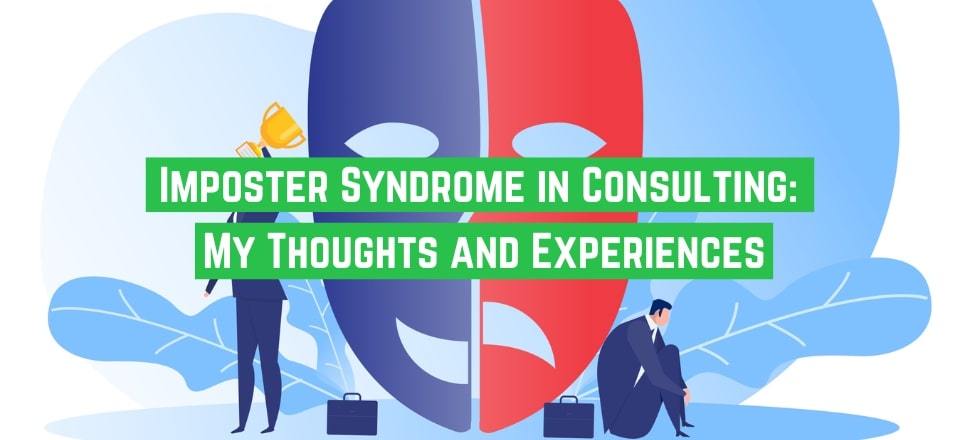Whether you’ve been consulting for years or are just getting started as an independent consultant, I’d be astonished if you have never had that uncomfortable feeling that you’re actually a bit of a fraud.
It’s a common side effect of working in our industry, perhaps not helped by the fact that the business and management consulting profession sometimes gets a bit of a bad rap.
Nevertheless, that sense of unworthiness, commonly known as imposter syndrome, can shake your confidence unnecessarily, so let’s bring it out into the open, and I’ll share some of my thoughts and experiences, because if you’ve ever suffered from imposter syndrome, you are by no means alone.

Of course, if you’re very new to our profession, you might not have experienced imposter syndrome yet, so I’ll explain what I mean in more detail.
Imposter Syndrome: The Consultant’s Curse
Anyone in the consulting business would have to be supremely arrogant to be immune from imposter syndrome. So if you’re in the consulting game, you’ve probably suffered from it at some point—or will do so—whether you’re new to the profession or you’ve been doing it for donkey’s years as I have.
I don’t suffer from it so much now because I’ve been practicing in my profession for so long. But it is perfectly natural and typically manifests during client assignments when you’re dealing with something you don’t have direct experience with or don’t know the answer to a particular issue or question.

Such a situation can make you feel like a little bit of a fraud or an imposter. So what can you do to prevent imposter syndrome from knocking your confidence, or to deal with it when it comes knocking?

What to do About Imposter Syndrome
Firstly, getting into projects where you lack the experience and skills to work confidently is unwise.
I mean that from a team perspective. To clarify, if you don’t have the necessary expertise personally, you should have someone on your consulting team who does. If you can’t field a team with the collective skills a project needs, I don’t recommend taking it on.

But the critical point I want to make here is that you can’t possibly know everything. For example, I work in the field of supply chain and logistics. Am I an expert in every single element of supply chain logistics? No, I specialize in specific areas.
Choose Your Niche, and Excel in it

If you’ve been consulting for a while or you’re starting to get into it, I recommend that you really niche down and ultimately become a leader in your particular field of expertise.
To illustrate the point I want to make, here’s an anecdote.
I had some minor surgery about a month ago, and a couple of weeks before, I was talking with the surgeon. I said, “Look! When you’re fixing problem A, I have another associated problem right next to it. Could you fix that at the same time?”

He replied, “How do you know I’m the type of surgeon that does that type of surgery?” So I said, “Oh, okay. So it’s a bit like plumbers and electricians, right?” He said, “Yeah, exactly!”
Being a layman regarding the medical profession, I thought I was looking at two similar types of surgery. But no, he deals just with the first of my issues. So what I needed to fix the second one was a surgeon who deals just with that specific discipline.
Consulting is the same, to a degree. You can be a specialist in a particular field. And when that’s the case, it’s best to get used to the fact that you can’t possibly know it all. If the client says, “Can you also do this?” and it’s not something that falls into your niche, it’s a good idea to straight up say, “Look, that’s not something that we do, but maybe I can introduce you to someone who can help with that.”
Build Your Team

The other key thing that I learned very early on in my consulting business, which I’ve been running for around 25 years, is that you’ve got to start building a team around you? So you can say to your client, “Look! I’m not a specialist in every aspect of (insert the industry or area that you consult in), but I have experts in every element among my team.
For example, I have quite a large team now. I’ve got experts in outsourcing, procurement, warehousing, transport, and other disciplines. I’m not necessarily an expert in all of those things.
So depending on your particular niche and the market you’re servicing, you’ve got to start recruiting people who complement your skill sets, enabling you to provide that comprehensive service to your clients. Of course, the clients don’t expect you, as the business owner, to be the expert in everything, but for maximum credibility, I recommend that you grow your team appropriately.
Practice Continuous Improvement
The other thing I would recommend is a discipline that I have always adhered to throughout my working life—continuous learning and self-improvement. I am continually enrolled in some education or coaching program or studying something.
You’ve got to keep up to speed with developments in your industry or line of business. You cannot just sit back on your laurels and do the same old thing year in and year out and expect to deliver the same level of service to your customers.
They expect you to know what’s going on in your field of expertise and, to a degree, to know much more about their situation than they do. So it’s incumbent on you to continually learn—and that doesn’t just mean technical knowledge. It will also help to spend plenty of time studying broader business topics.

Don’t Let Imposter Syndrome Slow You Down
So, there we go—imposter syndrome—we all feel it now and again. It’s quite a natural thing. Make sure that you’re operating, you know, within your field of expertise.
Build a good team around you to fill any skills gaps that you’ve got so that your business can provide the entire range of skill sets that your clients require.
Have you ever suffered from that sort of niggle thinking that maybe you’re a bit of an imposter, no matter how long you’ve been consulting in your field? Does it concern you? Let me know your thoughts by commenting down below.
Please note: This article is based on a recent video presented by Rob O’Byrne and posted on the Consulting Business School YouTube channel, so you might want to check his video out there. While you’re at it, why not subscribe to the channel? You’ll find a whole pile of useful videos there, and Rob and his team frequently add fresh content.



Recent Comments